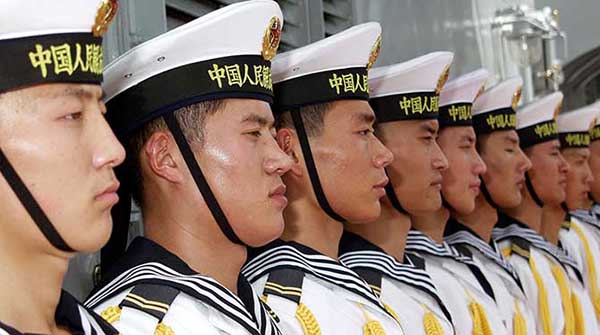A war over Taiwan would reshape the world, and Canada won’t be spared

Taiwan has been a geopolitical hotspot for decades, with tensions simmering between the island and China since their split in 1949. But Taiwan is not just a political issue—it’s a major player in global trade and security. Taiwan’s dominance in semiconductor production and its location near key shipping routes make it vital to the global economy. At the same time, its uncertain status raises the risk of military conflict.
Today, the stakes are higher than ever. Taiwan isn’t just a potential flashpoint for war—it’s an economic powerhouse. Any conflict in the Taiwan Strait would send shockwaves through global markets, politics, and security.
On Oct. 1, 1949, Mao Zedong declared the founding of the People’s Republic of China in Beijing. Meanwhile, Chiang Kai-shek and his nationalist Kuomintang forces retreated to Taiwan, setting up a government on Dec. 7 and cutting ties with communist China.
Since then, Taiwan has built its own military, currency and a thriving democracy. But Beijing maintains that Taiwan is a breakaway province that must be reunified with China—by force if necessary.
 China wants Taiwan. Taiwan wants democracy. The world wants stability. What happens now? |
| Recommended |
| Canada finally releases its long-awaited Indo-Pacific Strategy
|
| Ukraine, Taiwan, and the politics of big neighbour resentment
|
| If China invades, will Taiwan be on its own?
|
China has worked to isolate Taiwan diplomatically, blocking it from gaining formal recognition as an independent country. Only 12 nations officially recognize Taiwan (Canada isn’t one of them), and China ensures it is left out of international organizations.
Despite this, Taiwan has strengthened ties with the United States, particularly under former president Tsai Ing-wen and her successor, Lai Ching-te. That growing relationship has angered Beijing, leading to increased military provocations.
Beyond politics, Taiwan’s economy is a global force. Once referred to as the “Taiwan Miracle,” its rapid economic growth has made it the world’s 21st-largest economy. But its real claim to fame is semiconductors.
Taiwan produces about 60 per cent of the world’s microchips—essential for everything from smartphones and electric vehicles to military systems. The Taiwan Semiconductor Manufacturing Co., headquartered in Hsinchu Science Park, is the world’s largest chip producer, valued at US$426 billion.
A disruption in Taiwan’s semiconductor industry would have far-reaching effects, particularly in the U.S., Japan, South Korea and Canada. Entire industries could be thrown into disarray.
Meanwhile, China has ramped up military activity near Taiwan, frequently sending warplanes into Taiwan’s air defence zone and conducting aggressive naval drills. Chinese President Xi Jinping has been explicit: “No one can stop the reunification of China with Taiwan.”
The U.S. maintains a deliberately ambiguous position on Taiwan’s defence. While Washington acknowledges Beijing’s “One China” stance, it does not recognize Chinese sovereignty over Taiwan. It also sells advanced weapons to Taiwan but avoids making any firm commitments to intervene in the event of an invasion.
This leaves the risk of miscalculation dangerously high.
A war over Taiwan would have catastrophic global consequences. Bloomberg estimates such a conflict could cost the world US$10 trillion—an economic impact greater than the COVID-19 pandemic, the war in Ukraine and the 2008 financial crisis combined.
The Taiwan Strait is also one of the world’s busiest trade routes. Any disruption could throw global shipping into turmoil, spike inflation and upend supply chains.
Even Canada, despite its geographic distance, would be affected. Taiwan plays a crucial role in Canada’s trade, technology sector and economic stability. As a key Indo-Pacific partner, Canada relies on Taiwan for semiconductor imports and has strong economic ties with the island.
While Canada officially follows the “One China” policy—recognizing Beijing as the sole legitimate government of China—it continues to engage with Taiwan through trade and cultural exchanges. Much of this happens through the Canadian Trade Office in Taipei, which facilitates economic cooperation without formal diplomatic recognition.
Instability in Taiwan would have ripple effects in Canada, particularly in industries such as automotive manufacturing and telecommunications, which rely on semiconductors. A U.S.-China conflict over Taiwan could also put Ottawa in a difficult position, forcing it to reconsider its approach to China.
China’s increasingly aggressive posture and Taiwan’s commitment to maintaining autonomy have set the stage for a potential confrontation. However, war is not inevitable. The international community—including Canada—must push for diplomatic solutions to prevent an escalation.
Strengthening trade alliances, encouraging dialogue and ensuring Taiwan’s economic resilience are key steps. As a G7 nation, Canada has a role to play in supporting diplomatic efforts while protecting its own interests in the region.
The world is watching Taiwan more closely than ever. Can diplomacy prevent a crisis, or is the region on a path toward conflict?
If war breaks out, the consequences will be felt far beyond Asia. But for now, diplomacy remains the best way to avoid a crisis that could reshape the global order.
Isidoros Karderinis was born in 1967 in Athens, Greece. He is a journalist, foreign press correspondent, economist, novelist and poet. He is accredited by the Greek Ministry of Foreign Affairs as a foreign press correspondent and has built a distinguished career in journalism and literature.
Explore more on Taiwan, China, World economy, War/Conflict
Troy Media is dedicated to empowering Canadian community news outlets by providing independent, insightful analysis and commentary. Our mission is to support local media in fostering an informed and engaged public by delivering reliable content that strengthens community connections, enriches national conversations, and helps Canadians better understand one another.

